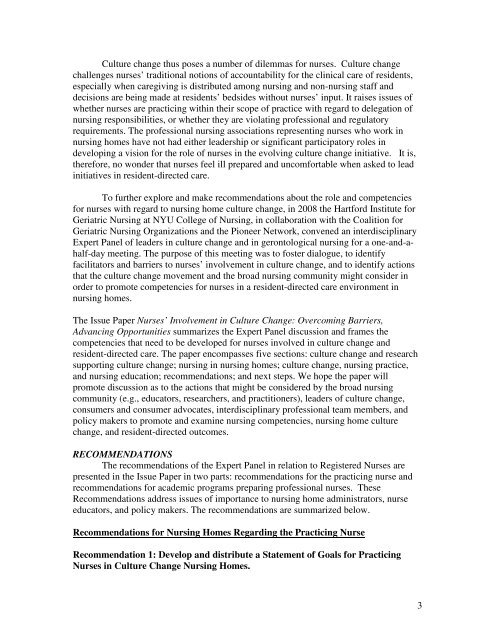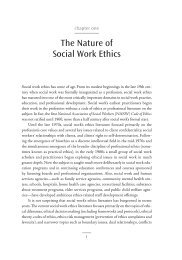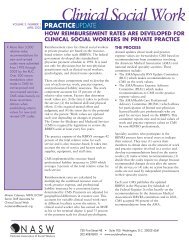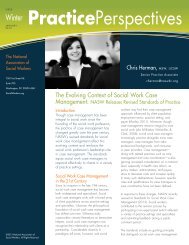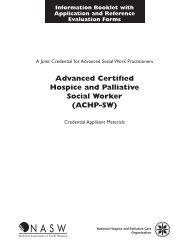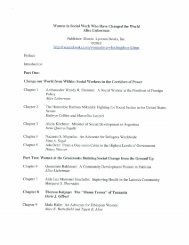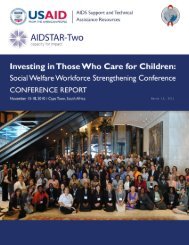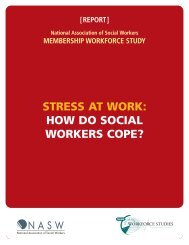Issue Paper Nurses Involvement in Nursing Home Culture Change ...
Issue Paper Nurses Involvement in Nursing Home Culture Change ...
Issue Paper Nurses Involvement in Nursing Home Culture Change ...
Create successful ePaper yourself
Turn your PDF publications into a flip-book with our unique Google optimized e-Paper software.
<strong>Culture</strong> change thus poses a number of dilemmas for nurses. <strong>Culture</strong> changechallenges nurses’ traditional notions of accountability for the cl<strong>in</strong>ical care of residents,especially when caregiv<strong>in</strong>g is distributed among nurs<strong>in</strong>g and non-nurs<strong>in</strong>g staff anddecisions are be<strong>in</strong>g made at residents’ bedsides without nurses’ <strong>in</strong>put. It raises issues ofwhether nurses are practic<strong>in</strong>g with<strong>in</strong> their scope of practice with regard to delegation ofnurs<strong>in</strong>g responsibilities, or whether they are violat<strong>in</strong>g professional and regulatoryrequirements. The professional nurs<strong>in</strong>g associations represent<strong>in</strong>g nurses who work <strong>in</strong>nurs<strong>in</strong>g homes have not had either leadership or significant participatory roles <strong>in</strong>develop<strong>in</strong>g a vision for the role of nurses <strong>in</strong> the evolv<strong>in</strong>g culture change <strong>in</strong>itiative. It is,therefore, no wonder that nurses feel ill prepared and uncomfortable when asked to lead<strong>in</strong>itiatives <strong>in</strong> resident-directed care.To further explore and make recommendations about the role and competenciesfor nurses with regard to nurs<strong>in</strong>g home culture change, <strong>in</strong> 2008 the Hartford Institute forGeriatric Nurs<strong>in</strong>g at NYU College of Nurs<strong>in</strong>g, <strong>in</strong> collaboration with the Coalition forGeriatric Nurs<strong>in</strong>g Organizations and the Pioneer Network, convened an <strong>in</strong>terdiscipl<strong>in</strong>aryExpert Panel of leaders <strong>in</strong> culture change and <strong>in</strong> gerontological nurs<strong>in</strong>g for a one-and-ahalf-daymeet<strong>in</strong>g. The purpose of this meet<strong>in</strong>g was to foster dialogue, to identifyfacilitators and barriers to nurses’ <strong>in</strong>volvement <strong>in</strong> culture change, and to identify actionsthat the culture change movement and the broad nurs<strong>in</strong>g community might consider <strong>in</strong>order to promote competencies for nurses <strong>in</strong> a resident-directed care environment <strong>in</strong>nurs<strong>in</strong>g homes.The <strong>Issue</strong> <strong>Paper</strong> <strong>Nurses</strong>’ <strong>Involvement</strong> <strong>in</strong> <strong>Culture</strong> <strong>Change</strong>: Overcom<strong>in</strong>g Barriers,Advanc<strong>in</strong>g Opportunities summarizes the Expert Panel discussion and frames thecompetencies that need to be developed for nurses <strong>in</strong>volved <strong>in</strong> culture change andresident-directed care. The paper encompasses five sections: culture change and researchsupport<strong>in</strong>g culture change; nurs<strong>in</strong>g <strong>in</strong> nurs<strong>in</strong>g homes; culture change, nurs<strong>in</strong>g practice,and nurs<strong>in</strong>g education; recommendations; and next steps. We hope the paper willpromote discussion as to the actions that might be considered by the broad nurs<strong>in</strong>gcommunity (e.g., educators, researchers, and practitioners), leaders of culture change,consumers and consumer advocates, <strong>in</strong>terdiscipl<strong>in</strong>ary professional team members, andpolicy makers to promote and exam<strong>in</strong>e nurs<strong>in</strong>g competencies, nurs<strong>in</strong>g home culturechange, and resident-directed outcomes.RECOMMENDATIONSThe recommendations of the Expert Panel <strong>in</strong> relation to Registered <strong>Nurses</strong> arepresented <strong>in</strong> the <strong>Issue</strong> <strong>Paper</strong> <strong>in</strong> two parts: recommendations for the practic<strong>in</strong>g nurse andrecommendations for academic programs prepar<strong>in</strong>g professional nurses. TheseRecommendations address issues of importance to nurs<strong>in</strong>g home adm<strong>in</strong>istrators, nurseeducators, and policy makers. The recommendations are summarized below.Recommendations for Nurs<strong>in</strong>g <strong>Home</strong>s Regard<strong>in</strong>g the Practic<strong>in</strong>g NurseRecommendation 1: Develop and distribute a Statement of Goals for Practic<strong>in</strong>g<strong>Nurses</strong> <strong>in</strong> <strong>Culture</strong> <strong>Change</strong> Nurs<strong>in</strong>g <strong>Home</strong>s.3


